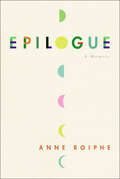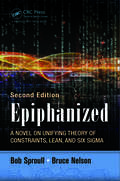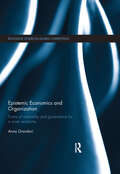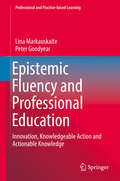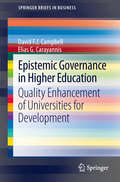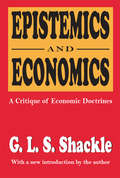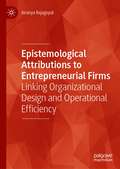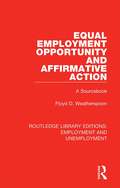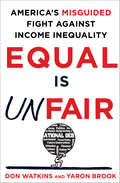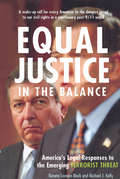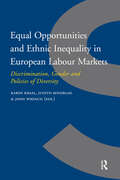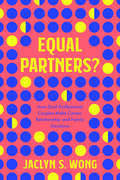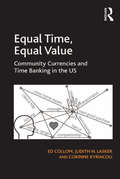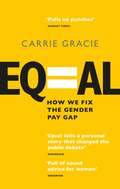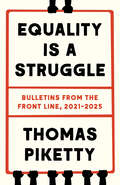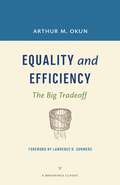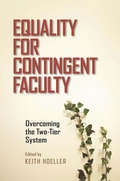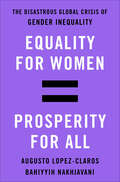- Table View
- List View
Epidemiologic Research on Real-World Medical Data in Japan: Volume 2 (SpringerBriefs for Data Scientists and Innovators #2)
by Naoki NakashimaThis book analyzes the development of medical big data projects in Japan.Japan is experiencing unprecedented population aging, and labor productivity has decreased accordingly. Big data analysis of the Japanese medical real-world database (RWD) has the potential to tackle this issue.To allow readers to gain an understanding of Japanese medical big data analysis, the book discusses the original Japanese system that generates medical RWDs in the hospital medical records system, the nationwide standardized health checkup system, and the public medical insurance system in Japan.After introducing four major big data projects in the healthcare–medical field in Japan, the book explains the importance of creating information standards to maintain data quality and to analyze medical big data. It enables readers to analyze which standards are installed in which RWDs, how the standards are maintained, and which issues are prevalent in Japan.This book also describes the ethical processes involved in big data projects involving medical RWDs in Japan.
Epilogue To The Age Of Turbulence
by Alan GreenspanIn this timely supplement to his incomparable reckoning with the contemporary financial world, Dr. Alan Greenspan presents his views on how the economy has changed since he wrote the #1 New York Times bestseller The Age of Turbulence. Covering the subprime mortgage crisis as well as other national and international issues, this Penguin eSpecial offers a front-line view of the global economy from the man who has worked at its heart longer and with greater effect than any other single living figure.
Epilogue: A Memoir
by Anne Richardson RoipheAnne Roiphe was not quite seventy years old when her husband of nearly forty years unexpectedly passed away. But it was not until her daughters placed a personal ad in a literary journal that Roiphe began to consider the previously unimagined possibility of a new man. Eloquent and astute, moving between heartbreaking memories of her marriage and the pressing needs of a new day-to-day routine, Epilogue takes us on her journey into the unknown world of life after love.
Epilogue: The Adventures of an IT Leader--Developing Systematic IT Management Frameworks
by Robert D. Austin Richard L. Nolan Shannon O'DonnellIT has changed not only the way we work and conduct business, but also how we (and our customers) play, how we consume, and how we educate our next generations. And yet the IT phenomenon, so evident in the expenditures of every organization, has not yet achieved management attention equal to other areas, such as finance, marketing, operations, and human resources. The main problem according to the authors? The absence of systematic frameworks that are useful in actual practice. This epilogue presents a brief outline of seven categories for developing IT management systems and examines the IT manager as a business leader. This chapter is excerpted from "The Adventures of an IT Leader."
Epilogue: What Organizations Can Do to Help Managers--and Build Competitive Advantage in the Process
by Linda A. HillManagement development has become an increasingly hot topic as organizations have come to realize that talent is an important driver of competitive advantage in the twenty-first century. Many have begun to take seriously the financial and human costs of even one failed manager and the growing body of evidence that points to the value produced by exceptional managers compared to their average counterparts. Making the business case for attracting, developing, and retaining talent is easy. Making it happen from day to day is another matter altogether. In this insightful epilogue to the second edition of her classic book, Becoming a Manager, Linda A. Hill explores what organizations can do to help managers in their journey to lead and learn. This chapter was originally published as the Epilogue of "Becoming a Manager: How New Managers Master the Challenges of Leadership."
Epiphanized: A Novel on Unifying Theory of Constraints, Lean, and Six Sigma, Second Edition
by Bruce Nelson Bob SproullUpdating the tools, principles, and methods presented in the bestselling first edition, this updated edition explains how to implement the authors proven improvement methodology that unifies the Theory of Constraints with Lean and Six Sigma.
Epistar and the Global LED Market
by Willy Shih Chen-Fu Chien Hung-Kai WangIt took BJ Lee many years to learn how to navigate the patent minefield that was the global LED industry. When his company was first spun off from the Industrial Technology Research Institute in Taiwan, he thought the essence of a good IP strategy was to develop a technology portfolio that was different from everybody else. But in the ensuing two decades of competition and litigation, he came to appreciate some of the nuances that enabled his company to have freedom to practice. This case exposes that journey and some of the learnings.
Epistemic Economics and Organization: Forms of Rationality and Governance for a Wiser Economy (Routledge Studies in Global Competition)
by Anna GrandoriThis book proposes a new approach to economics, management and organization that should help in making economic organization ‘wise’, ‘innovative’ and ‘robust’ in an uncertain and risky world. Although the modern economy and society is ‘knowledge intensive’, Anna Grandori argues that the dominant economic, organizational and behavioural models neglect to a large extent the problem of valid knowledge construction and effective knowledge governance. The book integrates inputs from economics and behavioural science with insights from the philosophy of knowledge to define new micro-foundations: neither a calculative, deductive and omniscient ‘rational actor’; nor an experiential, adaptive and biased ‘behavioural actor’; but a knowledgeable and imaginative ‘epistemic actor’. The implications for contracts and organizations, sustained also by insights from law, are shown to be far reaching, including a new view of the nature of the firm as an entity-establishing agreement under which to discover uses of resources under uncertainty, and as a democratic institution.
Epistemic Fluency and Professional Education
by Lina Markauskaite Peter GoodyearThisbook, by combing sociocultural, material, cognitive and embodied perspectives ofhuman knowing, offers a new and powerful conceptualisation of professional epistemicfluency - a capacity that underpins professional knowledgeable action andinnovation. Using results from empirical studies it sheds light on practicalways in which the development of epistemic fluency can be recognised andsupported - in higher education and in the transition to work. Peoplewho are flexible in respect to different ways of knowing can be said to possessepistemic fluency -they are adept to combine different kinds of specialised and context-dependentknowledge and enact their knowing in solving problems encountered in the world. Whatdoes it take to be a productive member of a multidisciplinary team working on acomplex problem? What enables a person to integrate different types and fieldsof knowledge, indeed different ways of knowing, in order to make somewell-founded decisions and take actions in the world? What personal knowledgeresources are entailed in analysing a problem and describing an innovativesolution, such that the innovation can be shared in an organization orprofessional community? How do people get better at these things; and how canteachers in higher education help students develop these valued capacities? Theanswers to these questions are central to a thorough understanding of what itmeans to become an effective knowledge worker and resourceful professional.
Epistemic Governance in Higher Education
by Elias G. Carayannis David F. Campbell"Epistemic governance" refers to the cognitive and knowledge-related paradigms that underlie a social system. In this volume, the authors apply the concept to higher education. In a comprehensive review of recent literature, they define key terms and concepts, arguing that a good, effective and sustainable governance of higher education is not possible unless the epistemic structure and knowledge paradigms of higher education are addressed directly. Effective governance of academic institutions is particularly important, given their essential role in generating and disseminating knowledge. The authors consider the practical and policy implications of the epistemic approach for promoting quality assurance, quality enhancement, and quality management of higher education, and their impact on university administration and academic career development.
Epistemics and Economics: A Critique of Economic Doctrines
by G. L. ShackleIt is Shackle's view that human conduct is chosen with a view to its consequences. But these are in the future, which cannot be directly known. Expectation will confine itself to what is deemed possible, but this leaves it free to entertain widely diverse and rival hypotheses. How can such skeins of mutually conflicting ideas serve the formation of individual or institutional policy? This is the chief question this book examines.
Epistemological Attributions to Entrepreneurial Firms: Linking Organizational Design and Operational Efficiency
by Ananya RajagopalThis book endorses entrepreneurial philosophies and develops a conceptual thinking for redefining organizational design to achieve operational efficiencies. It aims at bridging entrepreneurial theories with strategies in practice. The book discusses entrepreneurial business modeling by mapping the entrepreneurial mindset and analyzing cognitive inputs to drive entrepreneurial efficiencies. This book also discusses effectiveness of marketing strategies, causes, and effects of marketing strategies on entrepreneurial performance, organizational design practices, and design-to-market concept in the context of contemporary organizational and operational designs.
Equal Employment Opportunity and Affirmative Action: A Sourcebook (Routledge Library Editions: Employment and Unemployment #9)
by Floyd D. WeatherspoonFirst published in 1985. In this remarkable book, the author has compiled a large collection of resource material that will be of benefit to the student as well as the practitioner of equal employment and affirmative action (EEO/AA). This book includes a broad scope of information on EEO/AA from its infancy and progresses through its rapidly changing and developing stages. Indeed, this book will be an invaluable asset in easily acquiring and supplementing one’s basic knowledge as well as providing a general overview of the subject area.
Equal Is Unfair: America's Misguided Fight Against Income Inequality
by Yaron Brook Don WatkinsWe’ve all heard that the American Dream is vanishing, and that the cause is rising income inequality. The rich are getting richer by rigging the system in their favor, leaving the rest of us to struggle just to keep our heads above water. To save the American Dream, we’re told that we need to fight inequality through tax hikes, wealth redistribution schemes, and a far higher minimum wage.But what if that narrative is wrong? What if the real threat to the American Dream isn’t rising income inequality—but an all-out war on success?In Equal is Unfair, a timely and thought-provoking work, Don Watkins and Yaron Brook reveal that almost everything we’ve been taught about inequality is wrong. You’ll discover:• why successful CEOs make so much money—and deserve to• how the minimum wage hurts the very people it claims to help• why middle-class stagnation is a myth• how the little-known history of Sweden reveals the dangers of forced equality• the disturbing philosophy behind Obama’s economic agenda.The critics of inequality are right about one thing: the American Dream is under attack. But instead of fighting to make America a place where anyone can achieve success, they are fighting to tear down those who already have. The real key to making America a freer, fairer, more prosperous nation is to protect and celebrate the pursuit of success—not pull down the high fliers in the name of equality.
Equal Justice in the Balance: America's Legal Responses to the Emerging Terrorist Threat
by Michael J. Kelly Raneta Lawson MackWith its sweeping critique of the USA Patriot Act and the Bush administration's maneuvers in pursuit of terrorists, Equal Justice in the Balance is a sobering and exacting look at American legal responses to terrorism, both before and after 9/11. The authors detail wide-ranging and persuasive evidence that American antiterrorism legislation has led to serious infringements of our civil rights. They show us how deviations from our fundamental principles of fairness and justice in times of heightened national anxiety-whether the Red Scare, World War II, or the War on Terrorism-have resulted in overreaction and excess, later requiring apologies and reparations to those victimized by a paranoia-driven justice system. While terrorist attacks-especially on a large scale and on American soil-damage our national pride and sense of security, the authors offer powerful arguments for why we must allow our judicial infrastructure, imperfect as it is, to respond without undue interference from the politics of anger and vengeance.
Equal Opportunities and Ethnic Inequality in European Labour Markets: Discrimination, Gender and Policies of Diversity (IMISCOE Reports)
by John Wrench Karen Kraal Judith RoosbladThe need to analyse labour market mechanisms in post-industrial Western societies is urgent. Despite laws and policy measures being developed at the European, national and local levels, job-seeking immigrants and ethnic minorities still suffer unequal access and ethnic discrimination. This volume endeavours to understand why.,Four chapters dealing with discrimination, gender, equity policies and diversity management present a lively discussion of the current scientific debate. Besides providing empirical evidence, the authors recommend methods for conducting further research in the field and evaluate the actual effects of discrimination-combating policies. One conclusion is that systematic analysis of the labour market and its subsequent equity policies must be supported by hard data, such as statistics. With its state-of-the-art scope and unique thematic exploration, this volume transfers knowledge from social science studies to a more operational realm. From here, both scholars and practitioners can help make equal opportunities more accessible than ever.
Equal Partners?: How Dual-Professional Couples Make Career, Relationship, and Family Decisions
by Jaclyn S WongMany young professionals seek egalitarian partnerships in which both partners work for pay and share unpaid housework and childcare. Yet working couples' realities often deviate from this ideal, with women trading off employment for family care. Will contemporary young adults repeat this pattern, or will they come closer to achieving equality in work and family? Equal Partners? seeks to explore this question. Drawing on six years of interviews with the partners in twenty-one different-gender couples, Jaclyn S. Wong documents how supportive workplaces, partners' steadfast gender-egalitarian attitudes, and partners' jointly coordinated actions all need to come together for couples to experience gender equality in work and family. This book offers a compelling study of the dynamics of couples in ambitious partnerships who aspire to equality as they navigate the external pressures that come with life planning.
Equal Time, Equal Value: Community Currencies and Time Banking in the US
by Judith N. Lasker Ed CollomEqual Time, Equal Value is the first systematic investigation of Time Banking in the United States. Drawing upon detailed case studies and making use of a mix of qualitative and quantitative data this book explores the most popular type of what has been called 'community currencies', in which localized systems based on time or dollar equivalents act as the medium of exchange. As such, it offers rich insights into the challenge presented by Time Banking to both the traditional social service and economic models, through the creation of an environment of reciprocity in which everyone's work has equal value. Locating Time Banking within the context of community currencies more generally and investigating the particular characteristics that are central to the production of positive outcomes, Equal Time, Equal Value examines the organizational characteristics of Time Banks, as well as the motivations of members, types and patterns of exchanges, and the effects on members of Time Bank participation in the USA. A timely and detailed exploration of exchange systems at a time of rising unemployment and declining confidence in global economic structures, this book will appeal to sociologists, cultural geographers and anthropologists with interests in social movements, the sociology of work, health promotion and policy, inequality and questions of the creation of community and sustainability.
Equal: How we fix the gender pay gap
by Carrie Gracie'Gracie tells the story of her struggle and eventual triumph as a way of encouraging us, of changing our society, of giving us all courage . . . Equal is a very important book' Sandi ToksvigEqual pay has been the law for half a century. But women often get paid less than men, even when they're doing equal work.Mostly they don't know because pay is secret. But what if a woman finds out? What should she do?In Equal, award-winning journalist Carrie Gracie covers her own experience of holding her employer - the BBC - to account and investigates why we're still being paid unequally. Equal will open your eyes, fix your resolve and give you the tools to act - and act now.'Equal tells a personal story that changed the public debate' Guardian'Pulls no punches' Sunday Times'Full of sound advice for women' Observer'A gripping personal story told with warmth and wit' Julia Gillard, former Australian Prime MinisterLonglisted for the Financial Times Business Book of the Year Award 2019
Equality Is a Struggle: Bulletins from the Front Line, 2021-2025
by Thomas PikettyAn acclaimed economist’s observations on four years of events that have shaped the world In this new volume drawn from his columns for the French newspaper Le Monde, renowned economist Thomas Piketty takes measure of the world since 2021: leaders grappling with the aftershocks of a global pandemic; politics shifting rightward in Europe and America; and wars breaking out and escalating, from Russia’s invasion of Ukraine to the conflict in Israel and Gaza. Together with an extended introductory essay arguing that an ecological socialism remains the best hope for global equality, these articles present Piketty’s vivid first draft of history—on the rise of China, political upheaval, armed conflict, inequity within and between nations, discrimination, and beyond. Despite the gathering clouds, Piketty continues to find reasons for hope.
Equality and Efficiency
by Lawrence H. Summers Arthur M. OkunOriginally published in 1975, Equality and Efficiency: The Big Tradeoff is a very personal work from one of the most important macroeconomists of the last hundred years. And this new edition includes "Further Thoughts on Equality and Efficiency," a paper published by the author two years later. In classrooms Arthur M. Okun may be best remembered for Okun's Law, but his lasting legacy is the respect and admiration he earned from economists, practitioners, and policymakers. Equality and Efficiency is the perfect embodiment of that legacy, valued both by professional economists and those readers with a keen interest in social policy. To his fellow economists, Okun presents messages, in the form of additional comments and select citations, in his footnotes. To all readers, Okun presents an engaging dual theme: the market needs a place, and the market needs to be kept in its place.As Okun puts it: Institutions in a capitalist democracy prod us to get ahead of our neighbors economically after telling us to stay in line socially. This double standard professes and pursues an egalitarian political and social system while simultaneously generating gaping disparities in economic well-being. Today, Okun's dual theme feels incredibly prescient as we grapple with the hot-button topic of income inequality. In his foreword, Lawrence H. Summers declares: On what one might think of as questions of "economic philosophy," I doubt that Okun has been improved on in the subsequent interval. His discussion of how societies rely on rights as well as markets should be required reading for all young economists who are enamored with market solutions to all problems. With a new foreword by Lawrence H. Summers
Equality and Efficiency
by Lawrence H. Summers Arthur M. OkunOriginally published in 1975, Equality and Efficiency: The Big Tradeoff is a very personal work from one of the most important macroeconomists of the last hundred years. And this new edition includes "Further Thoughts on Equality and Efficiency," a paper published by the author two years later.In classrooms Arthur M. Okun may be best remembered for Okun's Law, but his lasting legacy is the respect and admiration he earned from economists, practitioners, and policymakers. Equality and Efficiency is the perfect embodiment of that legacy, valued both by professional economists and those readers with a keen interest in social policy. To his fellow economists, Okun presents messages, in the form of additional comments and select citations, in his footnotes. To all readers, Okun presents an engaging dual theme: the market needs a place, and the market needs to be kept in its place.As Okun puts it: Institutions in a capitalist democracy prod us to get ahead of our neighbors economically after telling us to stay in line socially. This double standard professes and pursues an egalitarian political and social system while simultaneously generating gaping disparities in economic well-being.Today, Okun's dual theme feels incredibly prescient as we grapple with the hot-button topic of income inequality. In his foreword, Lawrence H. Summers declares: On what one might think of as questions of "economic philosophy," I doubt that Okun has been improved on in the subsequent interval. His discussion of how societies rely on rights as well as markets should be required reading for all young economists who are enamored with market solutions to all problems. With a new foreword by Lawrence H. Summers
Equality for Contingent Faculty: Overcoming the Two-Tier System
by Keith HoellerVice President Joseph Biden has blamed tuition increases on the high salaries of college professors, seemingly unaware of the fact that there are now over one million faculty who earn poverty-level wages teaching off the tenure track. The Chronicle of Higher Education ran a story entitled "From Graduate School to Welfare: The PhD Now Comes with Food Stamps." Today three-fourths of all faculty are characterized as "contingent instructional staff," a nearly tenfold increase from 1975.Equality for Contingent Faculty brings together eleven activists from the United States and Canada to describe the problem, share case histories, and offer concrete solutions. The book begins with three accounts of successful organizing efforts within the two-track system. The second part describes how the two-track system divides the faculty into haves and have-nots and leaves the majority without the benefit of academic freedom or the support of their institutions. The third part offers roadmaps for overcoming the deficiencies of the two-track system and providing equality for all professors, regardless of status or rank.
Equality for Contingent Faculty: Overcoming the Two-Tier System
by Keith HoellerVice President Joseph Biden has blamed tuition increases on the high salaries of college professors, seemingly unaware of the fact that there are now over one million faculty who earn poverty-level wages teaching off the tenure track. The Chronicle of Higher Education ran a story entitled "From Graduate School to Welfare: The PhD Now Comes with Food Stamps." Today three-fourths of all faculty are characterized as "contingent instructional staff," a nearly tenfold increase from 1975. Equality for Contingent Faculty brings together eleven activists from the United States and Canada to describe the problem, share case histories, and offer concrete solutions. The book begins with three accounts of successful organizing efforts within the two-track system. The second part describes how the two-track system divides the faculty into haves and have-nots and leaves the majority without the benefit of academic freedom or the support of their institutions. The third part offers roadmaps for overcoming the deficiencies of the two-track system and providing equality for all professors, regardless of status or rank.
Equality for Women = Prosperity for All: The Disastrous Global Crisis of Gender Inequality
by Augusto Lopez-Claros Bahiyyih NakhjavaniA groundbreaking book about the direct relationship between a woman's rights and freedoms and the economic prosperity of her country. "The authors speak to hearts as well as minds." —Maud de Boer Buquicchio, UN Special Rapporteur“Not only timely but profoundly important—a must-read." Jackie Jones, Professor of Feminist Legal studiesGender discrimination is often seen from a human rights perspective; it is a violation of women’s basic human rights, as embedded in the Universal Declaration, the UN Charter and other such founding documents. Moreover, there is overwhelming evidence that restrictions and various forms of discrimination against women are also bad economics. They undermine the talent pool available to the private sector, they distort power relationships within the family and lead to inefficiencies in the use of resources. They contribute to create an environment in which women, de facto, are second class citizens, with fewer options than men, lower quality jobs, lower pay, often the victims of various forms of violence, literally from the cradle to the grave. They are also not fully politically empowered and have scant presence in the corridors of power, whether as finance ministers, central bank governors, prime ministers or on the boards of leading corporations. Why is gender inequality so pervasive? Where does it come from? Does it have cultural and religious roots? And what are the sorts of policies and values that will deliver a world in which being born a boy or a girl is no longer a measure of the likelihood of developing one’s human potential?


